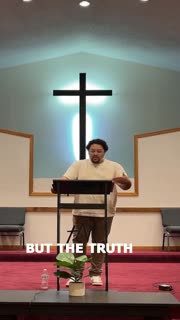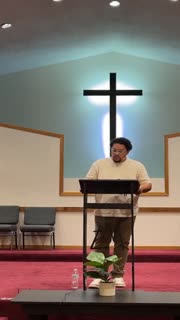Costly Worship: A Heartfelt Devotion to Christ
Devotional
Sermon Summary
Bible Study Guide
Sermon Clips
### Quotes for Outreach
1. "But the truth is that we're willing to give more for and to the things that we value the most. We sacrifice for the people, the places, the things which we put the most value upon. As we transition to our text, I just want to raise this question to your, hearing this morning, of what value do you put on Christ? In other words, what is Jesus worth to you?" [05:36] (33 seconds)
2. "Mary worshiped Jesus publicly even when it was not socially acceptable. Mary's not supposed to be in that room. But Mary embraces all the shame. Mary embraces all the humiliation in order to be at the feet of Jesus. You know, there are times when public displays of affection for Christ, when public acknowledgment, when public affirmation that Jesus Christ is Lord will cost you." [14:10] (30 seconds)
3. "Listen, no matter what you've been through, no matter what you're going through, no matter if you're going through something right now, we should all have an attitude of gratitude because God has been good to us, friend. He woke you up this morning, put a roof over your head, shoes on your feet, clothes on your back. And can I tell you that even if he didn't, he's still good." [21:57] (27 seconds)
4. "What if rather than scheduling church around our lives, we began to schedule our lives around church? Rather than saying, I can't be involved or I can't make it this Sunday or Wednesday, whatever it may be, because I have X, Y, Z. I said, I can't make it to X, Y, Z because I have church, because I have discipleship, because I have to go and serve in some way or capacity." [25:18] (24 seconds)
5. "Listen, aren't you glad that as Jesus was hung high and stretched wide, as he had nails in his hands and feet, a crown of thorns upon his head, listen, as he was beaten and brutalized for the sins that we committed, that Jesus did not cry out to the Father, Father, you're asking too much of me, take me down. In the words of C.T. Studd, if Jesus Christ be God and died for me, then no sacrifice can be too great, for me to make for him." [29:53] (30 seconds)
### Quotes for Members
1. "Mary's worship was rightly prioritized. The disciples get mad. They say that money could have been used for the poor. But Jesus says that Mary did a good thing. And Mary put Jesus, first. This is a stark contrast to the disciples. And if we're honest with ourselves this morning, many of us." [23:30] (24 seconds)
2. "Mary gave Jesus her best because Jesus deserves our best. Because Jesus is worthy of our best. What if rather than scheduling church around our lives, we began to schedule our lives around church? Rather than saying, I can't be involved or I can't make it this Sunday or Wednesday, whatever it may be, because I have X, Y, Z. I said, I can't make it to X, Y, Z because I have church, because I have discipleship, because I have to go and serve in some way or capacity." [24:55] (35 seconds)
3. "Costly worship is complete. In other words, costly worship requires us to be all in. By breaking the alabaster flask, Mary could never use that jar again. She smashes it. I see it kind of as a symbol of her dedication to Christ. I remember singing this song as a kid. I have decided to follow Jesus, no turning back. This is Mary's declaration of I am giving my all to Jesus, no turning back. Her chips were all on the table." [26:37] (40 seconds)
4. "The disciples don't see the beauty of Mary's act. Because they fail to see the value of Jesus. The disciples don't see the beauty of Mary's act because they fail to see the ultimate value and worth of Jesus. Nevertheless, church, can I encourage you this morning that though criticism and rebuke may come for your costly worship, Jesus has the final say." [34:25] (29 seconds)
5. "Mary worships, the disciples criticize, and Jesus defends. Look at verse 6. But Jesus said, Let her alone. Why do you trouble her? She has done a good work for me. Jesus commends Mary's worship. The actual Greek word used here to speak of a good work is probably even better translated as beautiful. What a word from Jesus. Jesus says, Mary has done a beautiful thing. You may be criticized here, church, but in heaven you have a master who applauds your love for help." [35:15] (46 seconds)
Ask a question about this sermon
1. "But the truth is that we're willing to give more for and to the things that we value the most. We sacrifice for the people, the places, the things which we put the most value upon. As we transition to our text, I just want to raise this question to your, hearing this morning, of what value do you put on Christ? In other words, what is Jesus worth to you?" [05:36] (33 seconds)
2. "Mary worshiped Jesus publicly even when it was not socially acceptable. Mary's not supposed to be in that room. But Mary embraces all the shame. Mary embraces all the humiliation in order to be at the feet of Jesus. You know, there are times when public displays of affection for Christ, when public acknowledgment, when public affirmation that Jesus Christ is Lord will cost you." [14:10] (30 seconds)
3. "Listen, no matter what you've been through, no matter what you're going through, no matter if you're going through something right now, we should all have an attitude of gratitude because God has been good to us, friend. He woke you up this morning, put a roof over your head, shoes on your feet, clothes on your back. And can I tell you that even if he didn't, he's still good." [21:57] (27 seconds)
4. "What if rather than scheduling church around our lives, we began to schedule our lives around church? Rather than saying, I can't be involved or I can't make it this Sunday or Wednesday, whatever it may be, because I have X, Y, Z. I said, I can't make it to X, Y, Z because I have church, because I have discipleship, because I have to go and serve in some way or capacity." [25:18] (24 seconds)
5. "Listen, aren't you glad that as Jesus was hung high and stretched wide, as he had nails in his hands and feet, a crown of thorns upon his head, listen, as he was beaten and brutalized for the sins that we committed, that Jesus did not cry out to the Father, Father, you're asking too much of me, take me down. In the words of C.T. Studd, if Jesus Christ be God and died for me, then no sacrifice can be too great, for me to make for him." [29:53] (30 seconds)
### Quotes for Members
1. "Mary's worship was rightly prioritized. The disciples get mad. They say that money could have been used for the poor. But Jesus says that Mary did a good thing. And Mary put Jesus, first. This is a stark contrast to the disciples. And if we're honest with ourselves this morning, many of us." [23:30] (24 seconds)
2. "Mary gave Jesus her best because Jesus deserves our best. Because Jesus is worthy of our best. What if rather than scheduling church around our lives, we began to schedule our lives around church? Rather than saying, I can't be involved or I can't make it this Sunday or Wednesday, whatever it may be, because I have X, Y, Z. I said, I can't make it to X, Y, Z because I have church, because I have discipleship, because I have to go and serve in some way or capacity." [24:55] (35 seconds)
3. "Costly worship is complete. In other words, costly worship requires us to be all in. By breaking the alabaster flask, Mary could never use that jar again. She smashes it. I see it kind of as a symbol of her dedication to Christ. I remember singing this song as a kid. I have decided to follow Jesus, no turning back. This is Mary's declaration of I am giving my all to Jesus, no turning back. Her chips were all on the table." [26:37] (40 seconds)
4. "The disciples don't see the beauty of Mary's act. Because they fail to see the value of Jesus. The disciples don't see the beauty of Mary's act because they fail to see the ultimate value and worth of Jesus. Nevertheless, church, can I encourage you this morning that though criticism and rebuke may come for your costly worship, Jesus has the final say." [34:25] (29 seconds)
5. "Mary worships, the disciples criticize, and Jesus defends. Look at verse 6. But Jesus said, Let her alone. Why do you trouble her? She has done a good work for me. Jesus commends Mary's worship. The actual Greek word used here to speak of a good work is probably even better translated as beautiful. What a word from Jesus. Jesus says, Mary has done a beautiful thing. You may be criticized here, church, but in heaven you have a master who applauds your love for help." [35:15] (46 seconds)










